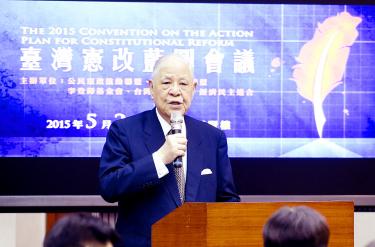Former president Lee Teng-hui (李登輝) yesterday said that there is no such thing as the so-called “1992 consensus” and it “only incurs ridicule” when President Ma Ying-jeou (馬英九) keeps “chanting” it.
The 92-year-old former president attended the 2015 Convention on the Action Plan for Constitutional Reform, co-hosted by several civic groups, including Civil Alliance to Promote Constitutional Reform (CAPCR) and the Lee Teng-hui Foundation, as the “honorary convener” yesterday.
Asked how he views the visit by Chinese Nationalist Party (KMT) Chairman Eric Chu (朱立倫) to Beijing and Chu’s scheduled meeting with Chinese President Xi Jinping (習近平) tomorrow, Lee said Chu went to China “to represent the KMT, [so] it has nothing to do with me nor with Taiwanese, as it’s the KMT’s own business.”
“[Chu] is the KMT chairman, and he might want to run for president in the future. As a country’s leader, what is most important is to answer to the needs of Taiwan and Taiwanese,” Lee said. “Don’t follow Mr Ma’s steps in reciting the ‘1992 consensus,’ which he has unnecessarily repeated for almost 10 years; it’s embarrassing. The attitude of a leader is lacking in his chanting.”
Lee denied that a consensus was reached in 1992 between Taiwan and China, saying that Ma’s statement underlining the “1992 consensus” as the most significant consensus made across the Taiwan Strait was “simply talking nonsense.”
“There is no such consensus,” Lee said, adding that he had asked then-Straits Exchange Foundation (SEF) legal bureau head Shi Hwei-yow (許惠祐), then-SEF deputy secretary-general Chen Rong-jye (陳榮傑) and then-SEF chairman Koo Chen-fu (辜振甫) — who were the delegates to the cross-strait meeting in 1992 — and was told there had been no such consensus.
“Why chant something that does not exist? Apparently it is in order to sing the same tune with China,” Lee said. “Taiwan is Taiwan; China is China; the idea of ‘one China’ is an ancient concept. The whole world is talking about ‘one China,’ but Taiwan, as a free, democratic society, should not handle the issue like this.”
Lee called the consensus “something that former Mainland Affairs Council minister Su Chi (蘇起) fabricated to placate the KMT in 2000.”
The “1992 consensus” refers to a supposed understanding reached during the cross-strait talks in 1992 that both Taiwan and China acknowledge that there is “one China,” with each side having its own interpretation of what that means.
In 2006, Su admitted he made up the term “1992 consensus” in 2000, before the KMT handed power to the Democratic Progressive Party.
Source: Taipei Times - 2015/05/03





















